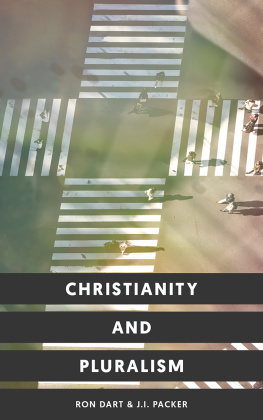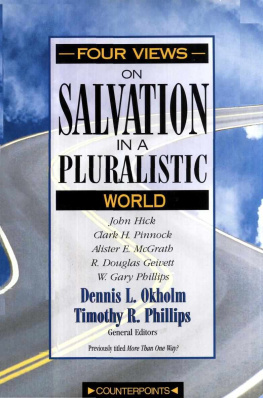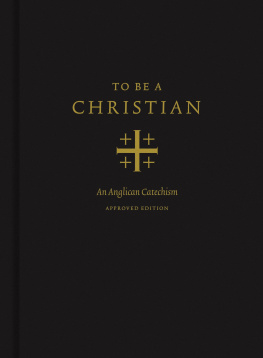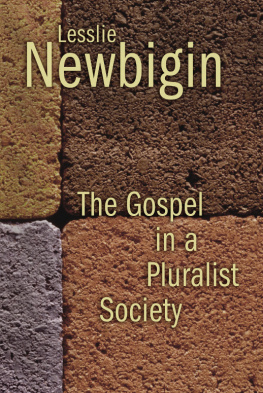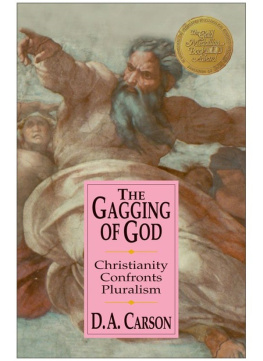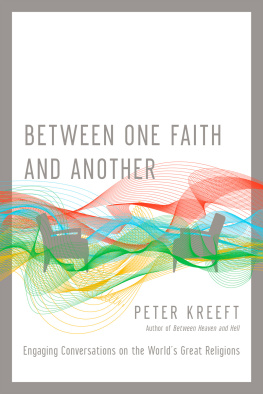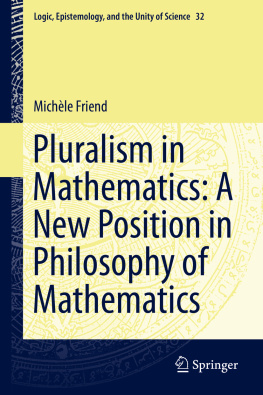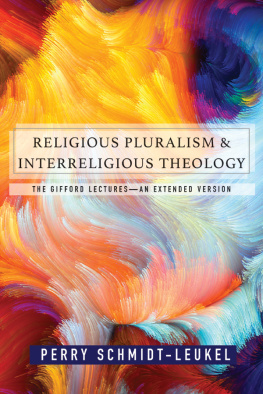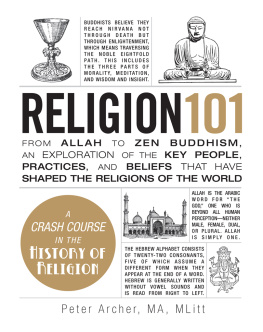CHRISTIANITY AND PLURALISM
RON DART & J. I. PACKER


Christianity and Pluralism
Copyright 2019 Ron Dart
Lexham Press, 1313 Commercial St., Bellingham, WA 98225
LexhamPress.com
All rights reserved. You may use brief quotations from this resource in presentations, articles, and books. For all other uses, please write Lexham Press for permission. Email us at .
Originally published as In a Pluralist World by Regent College Publishing (1998).
Print ISBN 9781683592877
Digital ISBN 9781683592884
Lexham Editorial Team: Todd Hains, Danielle Thevenaz
Cover Design: Peter Park
CONTENTS
Ron Dart
The Reverend Dr. Archie Pell
Ron Dart
J. I. Packer
Ron Dart
Ron Dart
I ts a perennial dialogue: how do the various religions interrelate? Was Jesus merely a Jewish rabbi, a forerunner of Muhammad, a Hindu avatar, a Buddhist bodhisattva, a crypto-gnostic, or a Sufi in disguise? Or are Judaism, Christianity, Islam, Taoism, Hinduism, Buddhism, and other religious traditions all diverse paths to a similar goal? These questions tend to dominate interfaith dialogue.
The publication in 1997 of Bishop Michael Inghams Mansions of the Spirit: The Gospel in a Multi-Faith World brought such questions to the fore once again. Bishop Ingham was, at the time, the Anglican Bishop of the diocese in New Westminster (British Columbia), and his challenging missive could not be ignored. Ingham pondered four models as a way of answering the multi-faith issue: inclusivist, exclusivist, pluralist, and a form of subtle syncretism. He advocated subtle syncretism in which mystics of most religions were in agreement in a hidden way.
This extreme form of ideological liberalismas also embodied in the life and work of John Hick and Bishops Ingham , John Spong, William Swing, and Richard Holloway (to name a few)alerted conservatives to a more serious problem in the life of the church: the subversion of Christian truth claims. Mansions of the Spirit required a response that was neither uncritical nor excessively criticala thoughtful and reasoned third way of sorts.
And so this short book was commissioned by a group of conservative Anglicans in the Anglican Church of Canada, who brought together a more classical catholic form of Anglicanism with Reformed, evangelical, and charismatic tendencies. (They were known as the Essentials Group; they convened the Essentials Conference in Montreal in 1995.) Regent College (Vancouver, BC) originally published this as In a Pluralist World , part of the Charting Our Course series in 1998.
Mansions of the Spirit was, in many ways, a popular rendition of the Primordial Tradition. The Primordial Tradition takes the position that religions are separate and discrete ways to God, the Ultimate, the Infinite (various names used), and yet they cannot and should not be synthesizedeach of these traditions offer legitimate ways, when followed in a disciplined and faithful path, to the higher esoteric and mystical heights of a greater unity. It is the mystics within each of the traditions that reveal this hidden unity in contrast to external diversity.
However, mystics do not all agree on the nature of union with the Ultimate. The Primordial Tradition tends to skew the facts and choose selective mystics that fit its predetermined thesis. In fact, the mystics of various traditions diverge greatly in their approaches to and understanding of Godif they even believe in a godand their understanding of the ultimate purpose of humanity.
The actual historic reason and context for Mansions of the Spirit and In a Pluralist World areexcept for those who lived through such a moment of historymostly forgotten. But the same questions remain. We need to ask substantive questions about our societys pluralistic approach to a variety of issues, including our multi-faith world. It is not very liberal of a liberal not to critique liberalism. But many liberals seem unable to question their blindspotssuch is the nature of ideology. They signal openness to the legitimate nature of alternate readings of timely and timeless issues, yet they are actually quite closed to such.
Many today continue to assume that history moves in an upward and positive directionthose bygone eras werent quite as enlightened as we are.
Hermann Hesse offers a nuanced and subtle critique of such people in his Nobel Prize winning novel, The Glass Bead Game. At its core The Glass Bead Game is about elite and highly educated contemplative intellectuals who weave together varied beads of thoughtthe best that had been thought, said, and done across time and culturesinto a grand and unified vision. It was assumed that this metanarrative of spiritual unity would bring an end to wars, poverty, and division. The many cultures, civilizations, tribes, and clans that had fought and destroyed one another again and again throughout history would now be united.
And thats the hope of many intellectuals today.
But Hesse had witnessed the betrayal of the loftiest ideals during World War I and World War II. The Glass Bead Game makes it abundantly clear that the nave idealism of a universal synthesis will often be betrayed and subverted by power politics, nationalism, and tribal intereststhe unfortunate realities of our fallen world that the synthesis is meant to overcome.
Pluralism and syncretism can be as exclusivist as any of the positions they rail against as being exclusive.
Ron Dart
University of the Fraser Valley
January 2019
I n the autumn of 1997, Bishop Michael Ingham reopened a long-standing debate within the Anglican Church of Canada (and within most other denominations as well) by the publication of his book, Mansions of the Spirit: The Gospel in a Multi-Faith World . The central topic is the validity of the Christian gospel concerning the uniqueness of Jesus Christ in a religiously pluralistic world. But, as Michael himself acknowledges in his book, this issue is inextricably intertwined with other matters such as the authority of Scripture and the place of evangelism in the church at the beginning of the twenty-first century. This booklet contains some early responses to Mansions of the Spirit from two members, one lay and one ordained, of the bishops own diocese of New Westminster.
Mr. Ron Dart is a highly respected academic trained in the study of world religion who was a founder of the department of world religions at the University College of the Fraser Valley. Rons two contributions here speak to the different ways in which inter-faith encounters can be approached, and he dispassionately outlines the strengths and weaknesses of each. His articles suggest that ultimately Mansions of the Spirit (particularly in the last three chapters) moves in the direction of a modified syncretist approach to inter-faith relations.
The Reverend Dr. J. I. Packer is a widely published theologian at Regent College with an international reputation. Jims paper in this booklet is both pastoral and theological and is particularly helpful in addressing the dilemma of how a Christian can hold to the New Testament truth without sacrificing care for those outside the Christian tradition, a dilemma which Mansions of the Spirit fails to resolve.
I commend these papers to your prayerful reading and reflection. May they help each of us discern the core issues in this debate. Then may we openly and honestly discuss the issues with an integrity that transcends name-calling (fundamentalist and heretic, for example). Our church can only be strengthened by a spirited yet irenic grappling with Truth.

